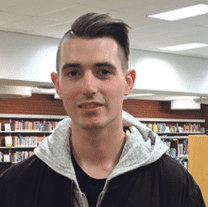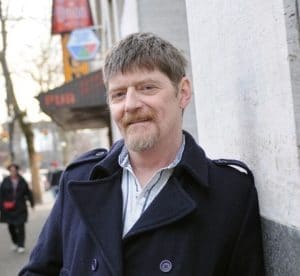As drug-user activists, we often lose a couple friends each month. This month has been particularly sad, with the passing of Dave Murray. Dave is a legend, in our circles and far beyond. His activism pushed drug policy forward in important ways, not just in Vancouver but in North America. So we felt it only right to let other people know who he was.
Dave was more than an activist; he was a believer in other people’s wellbeing. He was a friend to many, he didn’t judge people for using or not using, and he understood both sides of the struggles of substance use. He liked to remind people that not everyone who uses drugs is addicted—that most are not.
Dave was well known for reading a daily newspaper without fail, and for being someone who would always show up for you. That’s an important quality when you’re fighting for the rights of others, especially through the regulation of drugs.
Dave was the driving force that helped keep the doors open to Vancouver’s controversial but crucial Crosstown Clinic, which provides patients with a safe supply of diacetylmorphine—AKA heroin.
As someone who used heroin for decades, he participated in a lot of research around it, with his goal being to have the drug domestically produced in North America and available for any opioid user. From 2005-2007, Dave was a part of the North American Opioid Medication Initiative (NAOMI)—the continent’s first study of heroin-assisted treatment (HAT). He had his medication taken away when the study ended. But another research opportunity (SALOME) then became available to study and assess long-term opioid medication effectiveness.
As a participant in those studies, Dave was a powerful voice calling for the medication he was receiving to become widely available, as “compassionate care,” to anyone who used drugs. If doctors weren’t going to prescribe heroin to patients in a controlled, regulated way, he advocated for heroin compassion clubs to provide a safe place for people to access medication without the harms of the illicit market.
“His presence was the epitome of quiet courage and he was a force to anyone who knew him.”
In drug policy, one of our guiding principles is “Nothing about us without us.” Dave made sure that the voices of people who use drugs would not be dismissed. In January of 2011, Dave, with support from Ann Livingston, founded a new drug-user group, formed of participants in those two key studies: the SALOME/NAOMI Association of Patients [SNAP]. Every Saturday for years, Dave chaired a SNAP meeting, organizing the fight for heroin to be widely prescribed.
Since the news of Dave’s passing advocates, drug user activists, healthcare providers and friends of all kinds from all over the world have been sharing stories about the person Dave was.
“No matter how uncertain things were, we could always count on Dave,” said Jennifer Mackenzie, a former clinical nursing lead at Crosstown Clinic. “His presence was the epitome of quiet courage and he was a force to anyone who knew him.”
Quiet he may have been in some ways, but Dave was always passionate when speaking about his cause, and loved to talk about his grand plans. His very character demonstrated a kind of highly effective direct action. His soft-spoken eloquence was illustrated, for example, in the poignant 2017 video below, made by Pivot Legal Society, about his experience in heroin-assisted treatment. “I started to think about my life again,” he said, “and you start to feel a sense of self-worth again.”
His goal was always about having access to heroin, not just for some, but for all who needed it. He had sought this for so long that it was almost like he could see into the future, recognizing that the drug supply was going to become increasingly toxic, killing thousands of people in North America.
“Dave was pivotal in bringing heroin-assisted treatment to Canada,” said Jennifer.
Every peer-reviewed publication of HAT demonstrates positive outcomes, including major reductions in illicit drug use, crime, disease and overdose; and improvements in health and social outcomes. As a Drug Policy Alliance fact sheet on HAT states, it’s not available in the United States because “zero tolerance policies and federal law have stood in the way of this evidence-based method of treatment.”
There were many factors that made Canada more receptive, but the presence of Dave Murray was one of them.
“He was a friend and mentor to many, and a tireless advocate for the rights of others,” concluded Jennifer. “Dave made the world a better place than it was when he found it, and that is his legacy. He believed, so we believed.”
As drug-user activists we must bring home Dave’s mission. We need to produce heroin domestically and start looking at not just a pharmaceutical safe supply, but all forms of safe supply, including medications that traditionally have only been found on the illicit market. Dave had tried methadone many times and it failed him—so he knew the harm of forcing someone onto medication that just wasn’t the right option for that person.
We have all learned from Dave’s wisdom and are determined to achieve his goal.
This article was co-written by Matthew Bonn.
 Matthew is the program coordinator with the Canadian Association of People Who Use Drugs (CAPUD) and a National Board member with Canadian Students for Sensible Drug Policy (CSSDP).
Matthew is the program coordinator with the Canadian Association of People Who Use Drugs (CAPUD) and a National Board member with Canadian Students for Sensible Drug Policy (CSSDP).
Photograph of Dave Murray by Ben Nelms. Used with permission.






Show Comments